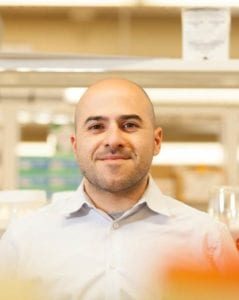Media Contact:
Nalini Padmanabhan
ASHG Communications Manager
301.634.7346
press@ashg.org
For Immediate Release
Friday, October 9, 2015
3:30 pm U.S. Eastern Time (UTC-05:00)
Findings Reported at ASHG 2015 Annual Meeting

BETHESDA, MD – By analyzing the types of gut bacteria present around colorectal tumors, researchers have found a way to predict key genetic mutations in the tumors themselves, a method that could eventually inform the development of colorectal cancer diagnostics and therapeutics. Their findings were presented at the American Society of Human Genetics (ASHG) 2015 Annual Meeting in Baltimore.
Led by Ran Blekhman, PhD, Assistant Professor of Genetics, Cell Biology, and Development at the University of Minnesota and senior author on the study, the researchers examined the genetic differences between colorectal tumor cells and healthy colon cells from 44 adults with colorectal cancer. They looked for correlations between specific mutations in the tumor cells and the composition of the tumor microbiome – the types of bacteria present in the tumor’s immediate environment and their relative abundance – and found relationships between the two.
“Ours was the first study to analyze both of these factors together,” said Michael B. Burns, PhD, a postdoctoral researcher in Dr. Blekhman’s laboratory. “Previous studies have found associations between certain mutations and colorectal cancer, and between certain microbiome characteristics and cancer, but had not integrated the two,” he explained.
The researchers found that in general, the more cancer-associated mutations a person’s tumor cells had, the more varied his or her tumor microbiome was. In fact, specific mutations in tumor cells were associated with the presence of specific types of bacteria in the microbiome. Together with Dan Knights, PhD, Assistant Professor of Computer Science and Biotechnology at the University of Minnesota, Dr. Blekhman and colleagues developed a method to predict the types of mutations present in a tumor based on its microbiome. On average, the method correctly predicted about half of the most common mutations found in the tumor.
“We found that it could be possible to genetically classify the colorectal tumor a person has without having to do a biopsy and dissect it,” Dr. Blekhman said. “This could eventually provide a non-invasive and inexpensive approach to inform diagnosis and treatment.”
In the longer term, he added, this research could also inform the development of new treatments for colorectal cancer. “By studying interactions between tumors and the bacteria in their microbiomes, we would better understand the bacteria’s role in causing tumors to form and grow – if they even have such a role – and eventually, we may be able to treat cancer by changing aspects of its microbiome,” Dr. Blekhman said.
The researchers caution that their current findings show only a correlation between microbiome composition and mutations in colorectal tumors. As yet, there is no evidence that bacterial changes cause colorectal cancer, but Dr. Blekhman and colleagues plan to study this question experimentally. They also plan to evaluate whether colorectal tumor microbiome composition can be assayed from stool samples, and if this data can also be used to predict the type of mutations present in the tumor cells.
Presentation: Dr. Blekhman will present his research on Friday, October 9, 2015, from 3:30-3:45 p.m., in Room 318/321 of the Baltimore Convention Center.
Press Availability: Dr. Blekhman will be available to discuss this research with interested media on Wednesday, October 7, 2015, from 1:30-2:30 p.m., in the ASHG 2015 Press Office (Room 301).
Reference: Blekhman R et al. (2015 Oct 9). Abstract: Genomic landscape of colorectal tumors shapes the microbiome of the tumor microenvironment. Presented at American Society of Human Genetics 2015 Annual Meeting. Baltimore, Md.
About the American Society of Human Genetics (ASHG)
Founded in 1948, the American Society of Human Genetics is the primary professional membership organization for human genetics specialists worldwide. Its nearly 8,000 members include researchers, academicians, clinicians, laboratory practice professionals, genetic counselors, nurses, and others with an interest in human genetics. The Society serves scientists, health professionals, and the public by providing forums to: (1) share research results through the ASHG Annual Meeting and in The American Journal of Human Genetics; (2) advance genetic research by advocating for research support; (3) educate current and future genetics professionals, health care providers, advocates, policymakers, educators, students, and the public about all aspects of human genetics; and (4) promote genetic services and support responsible social and scientific policies. For more information, visit: http://new.ashg.org.
9650 Rockville Pike | Bethesda, MD 20814 | 301.634.7300 | society@ashg.org | new.ashg.org
Connect with ASHG on Twitter (@GeneticsSociety) | Facebook | LinkedIn
